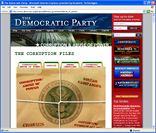Democrats'
Hopes for 2006
[Dec. 12, 2005] Eleven months
out from the 2006 mid-term elections Democrats have some grounds for optimism.
They hope issues such as Iraq, Bush's efforts to overhaul Social Security,
high gas prices, criticism over Bush's handling of Hurricane Katrina, and
what they call "a culture of corruption" create a climate in which they
can achieve gains in the House and Senate.
|
Democrats have focused particular
attention on the "culture of corruption," and there were indeed a number
of investigations and charges involving Republican officials. Top
lobbyist Jack Abramoff was indicted on August 11, 2005 by a federal grand
jury in Fort Lauderdale, FL on fraud and conspiracy charges. A Texas
grand jury indicted House Majority Leader Tom DeLay (R-TX) on September
28, 2005 for conspiracy to violate campaign finance laws, forcing him to
step down from his leadership position. Senate Majority Leader Bill
Frist (R-TN) has come under investigation for the sale of HCA stock held
in a blind trust. Washington was fixated for weeks on whether special
prosecutor Patrick Fitzgerald's investigation into the outing of CIA agent
Valerie Plame would lead to indictment of President Bush's top aide Karl
Rove. Finally, on October 28, 2005, Fitzgerald announced indictment
of Vice President Cheney's Chief of Staff I. Lewis "Scooter" Libby on five
charges. Republicans have generally discounted partisan attacks and
"chatter," and none of these figures have been convicted of anything.
However, the case of Rep. Duke Cunningham (R-CA) was clearcut; he pleaded
guilty to fraud, conspiracy to commit bribery and tax evasion and resigned
effective December 1, 2005. This rash of stories filling the news
certainly has not helped the image of the GOP.
|

DNC website has a special
section devoted to "The Corruption Files" (10/05) |
|
While Democrats savor Republicans'
difficulties, they have their own image problems. They will have
to present a compelling positive agenda of their own. William Galston
and Elaine Kamarck's study The Politics of Polarization,1
released by Third Way on October 6, 2005, offered
one set of ideas and was widely discussed. In an October 14, 2005
letter to the editor to the New York Times, former CBS News anchor
Walter Cronkite raised the idea of a Democratic mid-term convention.
There have also been suggestions that Democrats may try to emulate the
Republicans' "Contract with America" from 1994.
The power of incumbency and
the increasing number of non-competitive districts weigh against major
changes in the House, as outlined in FairVote's "Dubious Democracy 2005"
report.2 Nonethess
there is a window for Democrats. In a September 15, 2005 memo Mark
Gersh, Washington director for the National Committee for an Effective
Congress (NCEC), wrote, "Democrats have succeeded in expanding the number
of overall marginal House seats that are in play from around the 30 or
so that were in play last cycle to about 50 in 2006. Democrats probably
need to have at least 40 House seats in play to have a realistic chance
of winning the 15 seats needed in order to take back control."3
The Campaign Finance Institute4
estimated in Oct. 2005 that "there are 76 potentially competitive House
districts," and looking at fundraising in the first nine months of 2005
CFI found "active major party rivalry in 40 potentially competitive contests."
ema 12/12/2005
Notes:
1. William Galston and Elain
Kamarck. "The Politics
of Polarization." Third Way. Oct. 6, 2005.
2. FairVote. "Dubious
Democracy 2005." July 25, 2005.
3. Mark Gersh. "Changing
Demographics and Hope for 2006." NCEC Memo. Sept. 15, 2005.
4. Campaign Finance Institute.
"Democratic
Challengers Financially Stronger than Two Years Ago in Potentially Competitive
House Districts." Oct. 27, 2005.
Oct.
28, 2005--Special prosecutor Patrick Fitzgerald makes his way to the
E. Barrett Prettyman U.S. Courthouse on the morning the grand jury indicted
top White House aide Scooter Libby.
Sept.
24, 2005--Anti-war demonstration.
July
14, 2005--MoveOn.org demonstration calling on President Bush to fire
Karl Rove.
June
1-3, 2005--Campaign for America's Future "Take Back America Conference,"
including Social Security march.
May
12, 2005 -- Campaign for a Cleaner Congress's "K Street Carnival O'
Corruption" outside Tom Delay tribute.
April
26, 2005--Americans United to Protect Social Security rally.
| Copyright
© 2004, 2005 Eric M. Appleman/Democracy in Action |
 |

